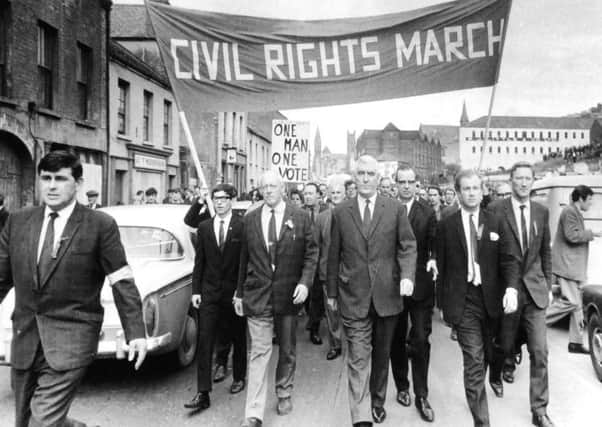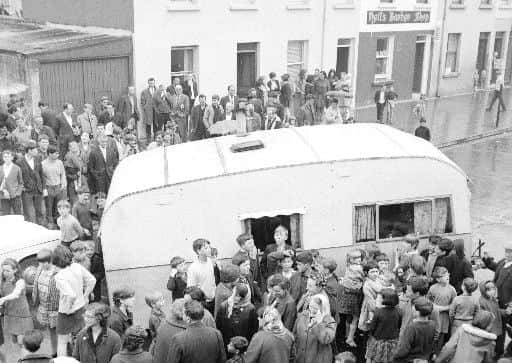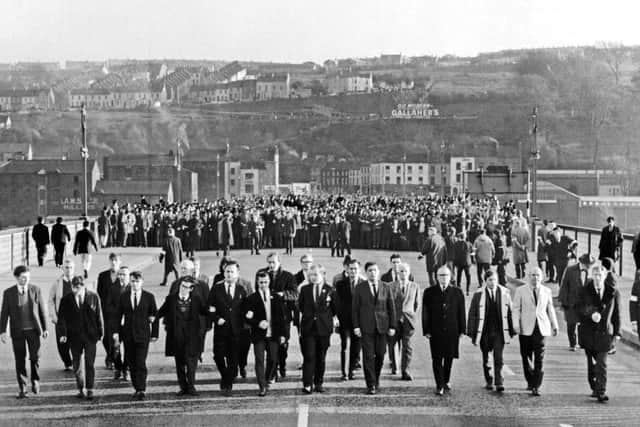'˜Those batons fell on minds and hearts'


The documents, shared with the ‘Derry Journal’ by local man, Frankie McMenamin, detail events from 50 years ago today (October 9, 1968) to November 19, 1968, and show that the committee was formed four days after that fateful march.
Ten days later, 5,000 took part in a mass two-hour sit down “on the wet stones” of Guildhall Square to listen to the committee’s “peaceful in principle and non-violent in execution” policy on housing, employment and improved community relations among other key issues.
Advertisement
Hide AdAdvertisement
Hide AdA march to The Diamond to complete the original route took place on November 2, after which 20,000 people attended a mass march on November 16, despite this also having been banned.


The packed public meeting on November 19, 1968 was held in the Guildhall, with the committee members listed as chairman Ivan Cooper; vice-chairman John Hume; secretary Michael Canavan; treasurer, James Doherty; Press officer, John Patten; chief steward, Paul Grace and deputy chief steward, Patrick (Paddy Bogside) Doherty.
Other committee members present were Johnny White, Fionbarra O Dochartaigh, William Breslin, Claude Wilton, Eamon Melaugh, Dermot McClenaghan, Brendan Hynes and William Kelsall.
Secretary Mr Canavan told those gathered: “If the Citizens’ Action Committee was born on October 9th, it was surely conceived on October 5th, the offspring on one side of the indomitable spirit of the people of Derry and on the other of their suffering on that memorable day.
Advertisement
Hide AdAdvertisement
Hide Ad“For on that day,” he said, “a group of no more than 500 strong set out to march in Duke Street for Civil Rights. The government of Northern Ireland had them surrounded in the streets of their own city, beaten to the ground with truncheons and humiliated with water cannon. But when those batons rose, they fell not only upon the voteless, homeless, jobless few, but upon the minds and hearts of every thinking person in this city.”


The report states that the 20,000 strong march had been subjected to a ban introduced just days after Ian Paisley and the loyal orders were permitted to have marches in the city.
As tensions rose ahead of the November march, the Bishops of Derry “had declared an all-night vigil for peace in the city with both the Protestant and Catholic Cathedrals open to all” which was deemed “an event unprecedented in Irish history.”
“At the request of your committee, the bishops had undertaken personally to ask Captain O’Neill to investigate the causes of discontent in the city,” the secretary stated, adding that both the Protestant and Catholic bishops had directly appealed for the lifting of the ban.
Advertisement
Hide AdAdvertisement
Hide AdThe report states had the ban was broken, not just on the mass march, but time and again in Derry by nine groups “including schoolchildren, girl factory workers, dockers, unemployed youths and industrial workers, - truly ‘the ban that never was’.”
The heads of governments had been forced to take notice following the events in Derry and this focus, in turn, had led to cautious hope that they may have to implement badly needed reforms to end systemic inequality.
“For our part, we know full well that these momentous events have been set in train only by events here in Derry and we are firmly resolved that the Campaign for Civil Rights in this city shall not fail or falter until all our objectives have been achieved - come what may.”